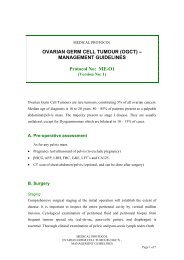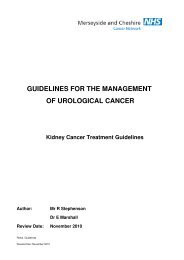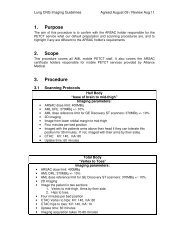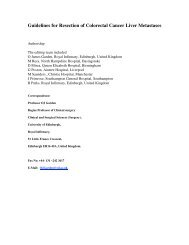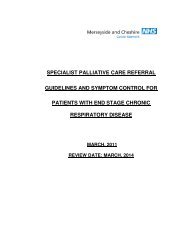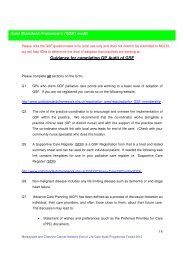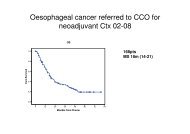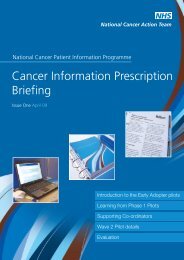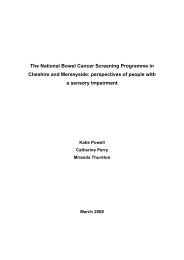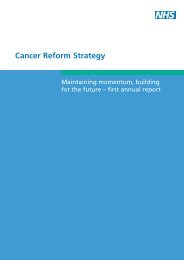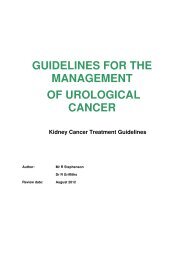Cancer Reform Strategy - NHS Cancer Screening Programmes
Cancer Reform Strategy - NHS Cancer Screening Programmes
Cancer Reform Strategy - NHS Cancer Screening Programmes
- No tags were found...
You also want an ePaper? Increase the reach of your titles
YUMPU automatically turns print PDFs into web optimized ePapers that Google loves.
48 CANCER REFORM STRATEGYwill include access to MRI scanning asstated in the NICE partial update of theFamilial Breast <strong>Cancer</strong> Guideline (October2006). It is expected that this new systemwill be in place from 2009.3.27 There is also a need to ensure that healthinequalities are tackled with targetedprogrammes that increase the uptake ofscreening in poor communities and in BMEcommunities. Commissioners in PCTs withlow coverage levels will wish to developthese programmes.Improving bowel screening3.28 Rollout of the <strong>NHS</strong> Bowel <strong>Cancer</strong><strong>Screening</strong> Programme started in 2006. Thisprogramme is aimed initially at men and womenaged 60-69, as this is the age group for whomthe benefits of screening are expected to belargest. Test kits will be sent to participants everytwo years.3.29 The programme is being coordinatedthrough five regional hubs based on the fiveConnecting for Health clusters: Midlands & theNorth West (located in Rugby), North East andYorkshire (Gateshead), Eastern (Nottingham),Southern (Guildford) and London (Harrow).These hubs are responsible for the call and recallsystems and for sending the test kits to people’shomes. They also receive and process thecompleted test kits. People who are givenpositive test results are then booked in to localscreening centres that are responsible fordiscussing the results with the patient and forundertaking colonoscopies.3.30 Fifteen local screening centres wereestablished in the first wave (2006-07) with afurther 20 centres expected to come on streamin Wave 2. As at the end of October 2007, over574,000 kits had been sent out and over305,000 kits returned. Over 10,000 men andwomen aged 70 or over had self-referred forscreening. Just under 5,500 men and womenhad positive test results and were referred totheir local screening centre for furtherassessment. Over 3,500 colonoscopies had beenundertaken, with over 1,600 polypectomies andover 400 cancers detected. Full rollout to peopleaged 60-69 is expected by December 2009.3.31 As announced in September 2007, the<strong>NHS</strong> Bowel <strong>Cancer</strong> <strong>Screening</strong> Programmewill be extended from 2010 to invite menand women aged 70 to 75 to take part.As a result, around one million more men andwomen will be screened each year. Research andpilot evidence shows this is feasible and effectiveand 61% of bowel cancers occur in those aged70 and over. 21 Men and women aged 75 andover will be able to request a kit to be testedevery two years.3.32 This extension will be managed by <strong>NHS</strong><strong>Cancer</strong> <strong>Screening</strong> <strong>Programmes</strong> in partnershipwith local health services. In 2008/09, we willpilot the extension in five sites. This willenable us to learn lessons to inform the fullrollout of the extension from 2010.3.33 By the end of 2010, decisions will betaken about possible roll out to people intheir 50s. Depending on forthcoming researchfindings, a possible extension of the screeningprogramme to people in their 50s could eitherbe through the introduction of flexiblesigmoidoscopy or by extending faecal occultblood testing (FOBT).3.34 We will continue to monitor researchevidence on other new technologies closely,such as immunological FOBT and CT colographyand will take the opportunity presented by thenational screening programme to pilot newapproaches.<strong>Screening</strong> for other cancers3.35 The cancer research community iscommitted to investigating screeningapproaches in other cancers, particularly in themost common forms of cancer where a nationalscreening programme is most likely to be costeffective. Research is also underway intobiomarkers of early cancers where patients oftenhave no symptoms until the cancer has reacheda very late stage, such as pancreatic cancer.We will continue to support and monitor thisresearch and evaluate the potential for theintroduction of new screening technologies as



